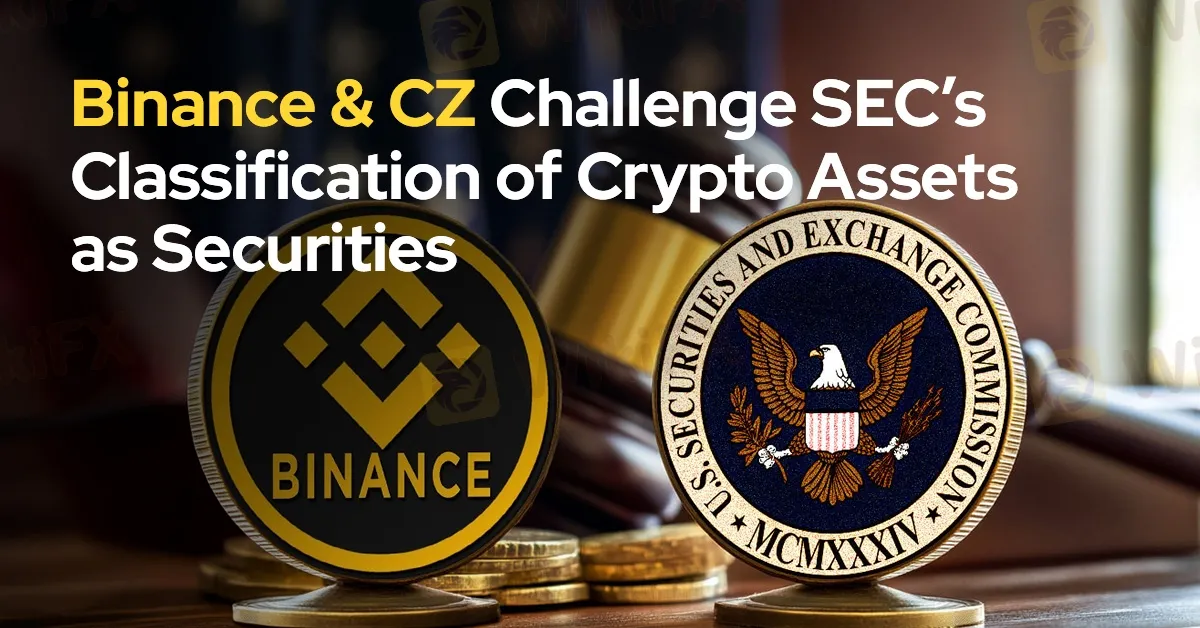Binance & CZ Challenge SEC’s Classification of Crypto Assets as Securities
Abstract:In a November 4 filing, legal representatives for Binance and its CEO Changpeng Zhao (CZ) contested the Securities and Exchange Commission’s (SEC) amended complaint, asserting that the SEC merely pays “lip service” to a court ruling that excludes crypto assets from the definition of securities. The lawyers argue that despite this ruling, the SEC has continued to disregard its implications on digital asset trading

In a November 4 filing, legal representatives for Binance and its CEO Changpeng Zhao (CZ) contested the Securities and Exchange Commissions (SEC) amended complaint, asserting that the SEC merely pays “lip service” to a court ruling that excludes crypto assets from the definition of securities. The lawyers argue that despite this ruling, the SEC has continued to disregard its implications on digital asset trading.
The court previously determined that cryptocurrencies do not qualify as securities, implying that secondary market resales of these assets should not be classified as securities transactions. However, Binance‘s legal team contends that the SEC’s amended complaint persists in labelling nearly all crypto transactions—including secondary market resales of tokens—as securities transactions. This stance is based on the premise that some investors might anticipate an increase in asset value.
Furthermore, the filing highlights that the SECs amended complaint fails to provide a clear legal distinction between assets and investment contracts. The lawyers argue that assets should not be deemed investment contracts merely because they are presented to customers within a framework of promises and expectations. They emphasize that the SEC has not established definitive standards to guide courts, litigants, or market participants in determining which digital asset transactions qualify as investment contracts.
Binances attorneys also criticize the SEC for what they describe as arbitrary decision-making, referencing a recently abandoned case where Ether transactions were initially classified as investment contracts. The legal team points out that the SEC has acknowledged its own inability to differentiate securities from non-securities like Beanie Babies at the pleading stage.

The document further elaborates on the arguments against the SEC‘s cases involving Binance and CZ, ultimately requesting the dismissal of the SEC’s claims without allowing for any amendments. This follows an amended complaint filed by the SEC in September, where the agency clarified that it did not intend to label cryptocurrencies and tokens as securities outright. The SEC admitted to using the term “securities” as a broad reference to various aspects of crypto sales and later committed to using the term “crypto asset securities,” apologizing for any resulting confusion.
The legal battle dates back to June 5, 2023, when the SEC filed a lawsuit against Binance, CZ, and several affiliated companies for allegedly violating securities trading regulations. The SEC based its allegations on a court document that recognized Binances BNB token and the BUSD stablecoin as securities. Binance is not alone in facing such legal challenges; the SEC has also filed lawsuits against other major crypto entities like Coinbase and Ripple, accusing them of offering unregistered crypto asset securities.
As the dispute continues, the outcome of Binance and CZs legal efforts could have significant implications for the broader cryptocurrency market and the regulatory framework governing digital assets.

Read more

Cryptocurrency Money Launderer Sentenced to Over 10 Years for Laundering $20 Million in Criminal Fun
An Indian national exposed laundering $20M via cryptocurrency and Hawala networks, revealing intricate money laundering techniques.

$TRUMP Token Soars: A New Era for Trump and Cryptocurrency?
Donald Trump has taken an unexpected step into the cryptocurrency market ahead of his January 20 inauguration by launching a memecoin named $TRUMP. The announcement sparked significant speculation and trading activity, with the coin’s value skyrocketing within hours of its debut.

Crypto.com’s Dual Front Battle: European Progress and U.S. Regulation
Crypto.com has received conditional approval to operate under the European Union’s Markets in Crypto-Assets (MiCA) framework. Once fully licensed, this will enable the company to serve customers throughout the EU under a standardised set of rules.

Boerse Stuttgart Digital Secures EU-Wide MiCAR Crypto License
Boerse Stuttgart Digital secures Germany’s first MiCA license, enabling EU-wide operations and expanding its digital asset services.
WikiFX Broker
Latest News
Will Gold Prices Continue to Rise Due to Trump’s Tariffs?
Miami Firm Owner Pleads Guilty to $6M Ponzi Scheme Fraud
NBI Cebu Arrests Forex Trader for Illegal Investment Solicitation
PU Prime's "Feather Your Trades" Contest! Begin
eToro Files for IPO with $5 Billion Valuation on NASDAQ
Is FizmoFX a Scam? Fraud and Account Suspension of Traders
IG Japan Extends US Stock CFD Trading Hours in 2025
ALERT! Warning against Livaxxen
Which Zodiac Sign Makes the Best Trader?
BOJ to Announce Policy Decision This Week, Market Bets on a Rate Hike
Rate Calc

